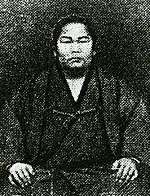Sakaigawa Namiemon
Sakaigawa Namiemon (境川 浪右衛門, May 28, 1841 – September 16, 1887) was a Japanese professional sumo wrestler from Katsushika District, Shimōsa Province. He was the sport's 14th yokozuna.
| Sakaigawa Namiemon | |
|---|---|
| 境川 浪右衛門 | |
19th century woodblock print of Sakaigawa by Kunisada | |
| Personal information | |
| Born | Udagawa Masakichi May 28, 1841 Katsushika District, Shimōsa, Japan |
| Died | September 16, 1887 (aged 46) |
| Height | 1.68 m (5 ft 6 in) |
| Weight | 128 kg (282 lb) |
| Career | |
| Stable | Sakaigawa |
| Record | 118–23–63 71draws-5holds(Makuuchi) |
| Debut | November, 1857 |
| Highest rank | Yokozuna (February 1877) |
| Retired | January, 1881 |
| Championships | 5 (Makuuchi, unofficial) |
| * Up to date as of July 2008. | |
Career

He was born Udagawa Masakichi (宇田川 政吉), later changed his surname to Ichikawa (市川), and then finally changed his given name to Namiemon. He made his debut in November 1857 and reached the top makuuchi division in April 1867, then fighting under the shikona name Masuizan Daishirō (増位山 大四郎). He won the equivalent of his first tournament championship in June 1868 from the maegashira ranks, emerging undefeated with eight wins (though this was before the championship system established in 1909). He was promoted to ōzeki (then sumo's highest rank) in April 1870 after winning two tournaments in a row from the rank of sekiwake. Following his promotion, he changed his ring surname to Sakaigawa, and shortly after its given name to Namiemon. The Sakaigawa name had previously been used by another wrestler from the same stable, who had been an ōzeki from 1857 to 1861.
Sakaigawa was initially given a yokozuna licence by the Osaka based House of Gojo in February 1876. He was admitted as a yokozuna by the House of Yoshida Tsukasa in February 1877. At that time, the Meiji Restoration was confusing the sumo world. Many sumo wrestlers were promoted to nominal yokozuna and the worth of the title yokozuna became very diluted as a result. Among them, later on, Sakaigawa became the only yokozuna admitted officially.
Sakaigawa retired in January 1881. In the top makuuchi division, he won 118 bouts and lost 23 bouts, recording a winning percentage of 83.7. However, he also recorded 71 draws because he often let his opponent attack first. He was nicknamed the "Meiji era Tanikaze".[1]
Top division record
- The actual time the tournaments were held during the year in this period often varied. The spring tournament recorded for 1878 was actually held in December of the previous year.
| - | Spring | Winter |
|---|---|---|
| 1867 | West Maegashira #6 4–1–1 4d |
West Maegashira #4 4–1–1 4d |
| 1868 | East Maegashira #2 8–0–1 d1 Unofficial |
East Komusubi 4–2–1 3d |
| 1869 | East Sekiwake 8–0–1 1d Unofficial |
East Sekiwake 7–0–1 2d Unofficial |
| 1870 | East Ōzeki 6–0–2 2d Unofficial |
East Ōzeki 6–1–1 2d |
| 1871 | East Ōzeki 5–0–2 |
East Ōzeki 6–0–2 1d 1h Unofficial |
| 1872 | East Ōzeki 4–1–1 4d |
East Ōzeki 3–1–1 5d |
| 1873 | East Ōzeki 6–0–1 3d |
East Ōzeki 3–2–2 3d |
| 1874 | East Ōzeki 4–1–1 3d 1h |
East Ōzeki 6–1–1 2d |
| - | Spring Haru basho, varied |
Summer Natsu basho, varied |
||||
|---|---|---|---|---|---|---|
| 1875 | East Ōzeki 4–1–2 3d |
Not held | ||||
| 1876 | East Ōzeki 6–1–1 2d |
East Ōzeki 4–2–1 3d |
||||
| 1877 | East Ōzeki 4–0–6 |
East Ōzeki 4–2–1 3d |
||||
| 1878 | East Ōzeki 4–1–2 2d 1h |
East Ōzeki 3–1–2 3d 1h |
||||
| 1879 | East Ōzeki 1–1–3 5d |
East Ōzeki 2–2–1 4d 1h |
||||
| 1880 | Sat out | East Ōzeki 2–1–4 3d |
||||
| 1881 | East Ōzeki Retired 0–0–10 |
|||||
| Record given as win-loss-absent Top Division Champion Retired Lower Divisions Key: d=Draw(s) (引分); h=Hold(s) (預り); nr=no result recorded Yokozuna (not ranked as such on banzuke until 1890) Ōzeki — Sekiwake — Komusubi — Maegashira | ||||||
*Championships for the best record in a tournament were not recognized or awarded before the 1909 summer tournament and the above unofficial championships are historically conferred. For more information see yūshō.
See also
| Wikimedia Commons has media related to Sakaigawa Namiemon. |
References
- Atsuo Tsubota. 横綱伝 14代~18代 (in Japanese). Archived from the original on 2005-11-27. Retrieved 2008-07-04.
- "Sakaigawa Namiemon Rikishi Information". Sumo Reference.
| Preceded by Kimenzan Tanigorō |
14th Yokozuna 1877–1880 |
Succeeded by Umegatani Tōtarō I | ||
| Yokozuna is not a successive rank, and more than one wrestler can hold the title at once | ||||